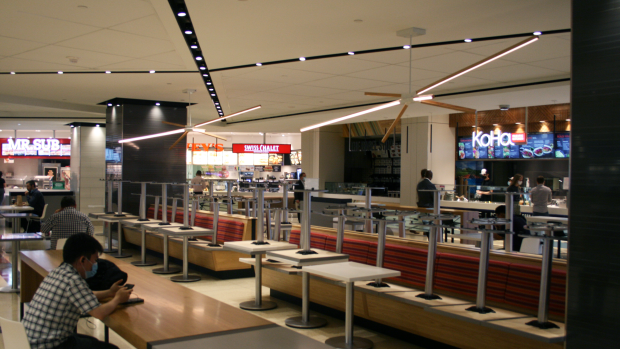Sep 11, 2020
Toronto's PATH remains eerily empty, six months into pandemic
Toronto’s PATH system faces uncertainty as Bay Street stays home
James An has been a fixture shining shoes over the past dozen years in downtown Toronto’s Scotia Plaza, but his tenure may soon be over thanks to COVID-19.
At his humble two-seat workspace nestled in the building's concourse, his regular customers included bank CEOs, senior investment bankers, and other Bay Street types looking for a little extra pizzazz and polish. A good day would see An shining for more than 20 clients, mostly in the lunchtime hour when workers would take their breaks.
These days, An is doing more sitting than shining. Foot traffic in the PATH network underneath Toronto’s financial district has slowed to a crawl, leaving him lucky to get even one customer per day since he returned to work in early July.
"I think I'll be okay," he told BNN Bloomberg. "But it's hard. My children have been laid off from their jobs, too. So I'm doing my best to support them, but it's just been quite tough."
An's tale mirrors a bevy of others found throughout the PATH, home to hundreds of small- and medium-sized businesses whose futures remain in doubt as COVID-19 keeps the bulk of the 200,000 people who used to step foot in the pedestrian network daily at home.
On a muggy late August afternoon, the pedestrian network offered an unique perspective of how the pandemic has changed the 30-kilometre network of restaurants, retailers, and offices in the past six months with thousands of Bay Streeters ordered to stay at home.

While the PATH offers most of its denizens a brief refuge from the daily grind of office life with a quick coffee or a snack, it also acts as Bay Street’s unofficial community hub. It's a place where connections get made, the next big idea is fostered and the place where some million-dollar deals get struck.
But now, only a handful of people can be spotted in the underground walkways, many of them retail workers distancing themselves during a rare break. And while many retailers have shut for good or are closed for renovations, including several Starbucks outlets, the ones that opted to re-open have strict distancing and hygiene guidelines … and few customers.
"Being able to bump into people you don't work with used to be one of my favourite things to do downtown, but it's clearly not happening now," said Gabriella Camardi, who works for a downtown Toronto financial services firm, in a phone interview with BNN Bloomberg.
Camardi recently returned to her office for just a couple days a month, but couldn't help but notice how eerily quiet the PATH is nowadays.
"I actually started walking outside more often because of how dead it is," she said. "It's a mission now to find lunch because so many restaurants are closed."

Jimmy Zhang owns three China Wok restaurants in PATH food courts. Typically, the locations serve some of his General Tao's chicken or spicy fish dishes to up to 300 customers a day. Today, only his Commerce Court location under CIBC’s headquarters remains open and he says he'd be lucky if he gets one-third of the clientele he used to serve. He's also keeping prices steady despite what he said is a 15-per-cent hike in grocery prices caused by the pandemic. Food prices have steadily climbed since March, with meat prices up about five per cent from last year, according to Statistics Canada.
"We're just surviving," he said. "We're not making any profit. Just enough to pay rent."
Zhang and An are among the 4,600 people who work in the PATH, according to City of Toronto statistics. The network is home to 1,200 restaurants, shops, and services, which generate roughly $1.7 billion in sales annually, the city said.
However, it appears to be too early to determine how COVID-19 has hurt the PATH. A spokesman with the Toronto Financial District Business Improvement Area said the agency hasn't conducted any surveys to see how many businesses have shuttered for good due to the pandemic. However, it has promoted some retailers on its social media platforms.

Statistics Canada said last month that the COVID-19 pandemic forced 88,187 Canadian businesses to close in April, the first full month of lockdowns. A survey released by the Canadian Federation of Independent Business found that 14 per cent of Canadian businesses, or about 150,000 firms, are at least somewhat considering bankruptcy or winding down operations due to the pandemic.
Grace Cho also doesn't know how much longer she'll be able to keep her dry cleaning business open. Typically she said she would see about 50 customers a day in her shop, located in Sheraton Centre below Queen Street West and University Avenue. However, after being forced to shut down for four months, business has slowed to a trickle.
"The only thing I had to do today was fixing a pair of jeans for $10," she told BNN Bloomberg. "The other day all I had was a sweater to alter. It's impossible to pay rent on just that."
But what may be more emotionally challenging for Cho is the loneliness she's experienced since returning to work in July.
"I miss saying hello to my customers," she said. "That doesn't happen anymore."


